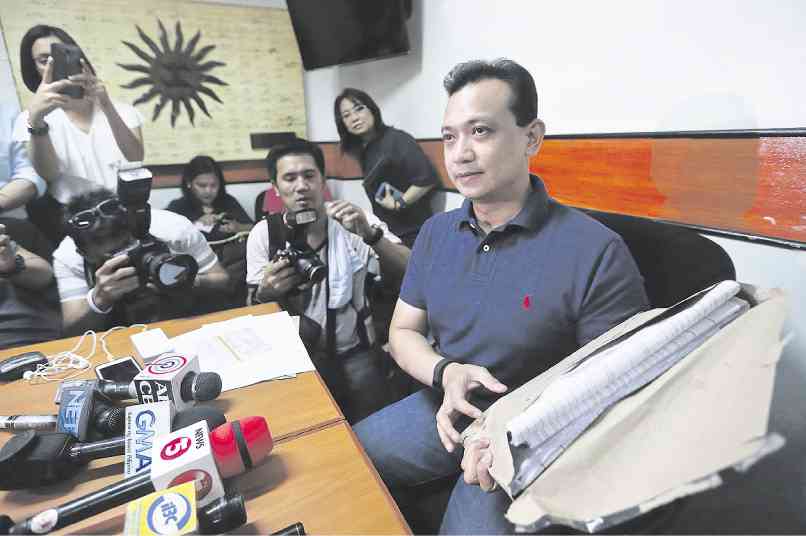
PROOF, HE SAYS Vice presidential candidate Sen. Antonio Trillanes IV shows members of the media a brown envelope which purportedly contains details of bank accounts that, the senator said, belong to presidential aspirant Rodrigo Duterte and his three children. LYN RILLON
HOW DID Sen. Antonio Trillanes IV get hold of the supposed bank transactions of presidential race front-runner Rodrigo “Digong” Duterte with Bank of the Philippine Islands?
Given the tough bank secrecy law in the Philippines, it’s mortal sin for any bank to leak such documents, especially for political purposes during this hotly contested election season.
BPI, Southeast Asia’s oldest bank, has vehemently denied breaching client confidentiality. “Our internal investigation reveals that there has been no such breach. BPI continues to have one of the most highly regarded data protection practices in the industry, and we are committed to protecting client information and preserving the trust bestowed on us by our clients all these years,” BPI said in a statement Friday night.
It’s not the first time that confidential bank account information had been leaked out and it’s possible that the bank itself had no inkling about it. Will BPI or any corporation be crazy enough to piss off the strongman who could be the next President (when the trend is to switch sides and latch on to the bandwagon)? As one former presidential contender had said, bank secrecy doesn’t exist in the country (despite the law that supposedly protects this).
So how did Trillanes get those documents? It must be in the same way how those bank documents of the recently departed Supreme Court Chief Justice Renato Corona got leaked out. No hackers are needed to achieve this.
Now, whether such an alleged (and undeclared) treasure chest could snatch the prospective presidency from the unorthodox Duterte in a way that the distasteful rape joke brouhaha failed to do is another story. We’ll find out in a week’s time. Doris Dumlao-Abadilla
‘Too easy’
SOME businessmen are wondering what steps—if any—the banking community will take following Sen. Trillanes’ disclosure of alleged bank account details of presidential race frontrunner Rodrigo Duterte.
A growing number of these businessmen are worried that the revelations follow a pattern that began with the unauthorized disclosure of bank account details of the late former Chief Justice Renato Corona during his impeachment trial. Then there were similar disclosures made on the alleged bank account transactions of Vice President Jejomar Binay and business associate Antonio Tiu.
Banks, too, are worried since any lawsuit filed by an aggrieved client would likely be directed at them first.
However, another source told Biz Buzz that blaming the banks for leaks would be barking up the wrong tree.
“To get the bank account information of anyone in the Philippines, all you need is to know whom to ask in either of two government agencies (hint: one is a financial regulator and the other is a law enforcement body). They can get the information for you,” the source said. Apparently, it’s really that easy. Daxim L. Lucas
Another PPP failure
DISAPPOINTMENT is probably an understatement when describing how bidders feel about a crucial public private partnership (PPP) deal to modernize and expand key regional airports.
We’re referring to the operations, maintenance and expansion of the Bacolod-Silay, Iloilo, Davao, Laguindingan and New Bohol air gateways, which had lured several of the country’s biggest conglomerates and their international partners.
Those following this space would know the Department of Transportation and Communications had until last Friday to set a bid submission date, presumably for sometime this week, if there was any chance to award the PPP project before President Aquino steps down by the end of June 2016. Apparently, this week was regarded as the absolute latest, considering the time needed to review technical and financial offers for five airports.
In any case, the DOTC was unable to set a date and the bidders we’ve spoken to believed there was no time left. We’re hearing that another DOTC bids and awards committee meeting would be held this coming Wednesday, but even that could be too late.
A timely award matters. With history as a guide, any government transition, especially if it involves one that’s not allied with the incumbent administration, inevitably leads to delays in infrastructure projects, sometimes to the tune of several years. The regional airports PPP is more painful for these bidders because it was considered “ripe” for an auction. Its only fault appears to be its timing is so close to the elections.
Bidders now wonder what will happen next. Apart from delays for the public, they’ve spent millions of dollars on their feasibility studies, costs to maintain consultants continue to run and big international partners are left hanging.
This is only the latest in a string of high-profile misfortunes to hit the Aquino administration’s PPP program. According to one airport bidder, some executives from their international partner had to fly out days before DOTC officials met on Friday. An appointment they couldn’t miss? Or perhaps the writing on the wall was becoming all too clear. Miguel R. Camus
E-mail us at bizbuzz@inquirer.com.ph. Get business alerts and a preview of Biz Buzz the evening before it comes out. Text ON INQ BUSINESS to 4467 (P2.50/alert).

